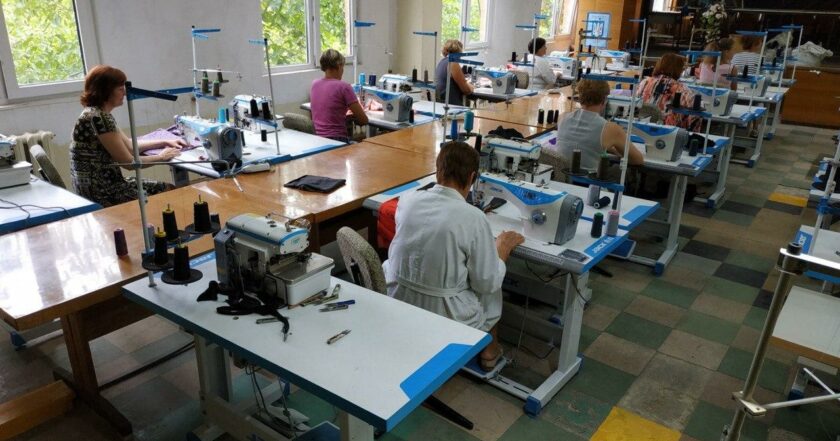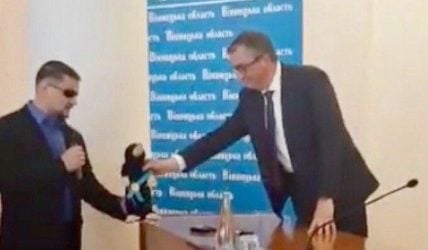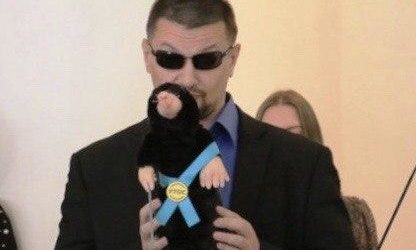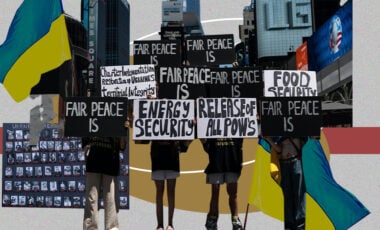More than just work: how blind people are employed in Vinnytsia
And why it is essential to "give people a fishing rod, and not a fish."

Involving citizens with disabilities in work is crucial for them and the state: the standard of living of people with disabilities increases, and their solvency, integration into society, and the possibility of self-realization improve.
According to official data, there were more than 2.5 million people with disabilities in Ukraine at the beginning of 2020, of which about a third had stable jobs. Enterprises and individuals using hired labor are obliged to allocate and create jobs for the employment of people with disabilities and provide them with appropriate working conditions and other social and economic guarantees provided by the current legislation.
But there is a specific category of people for whom it is impossible to get a job at a typical enterprise. These are entirely blind people and people with visual impairments. Their only hope of getting a job is specialized production.
Members of the society of the blind say you cannot survive without a job on a disability pension alone. For this reason, plus the fact that people need communication, people with disabilities of the first group, who are, as a rule, fully blind, strive to be helpful and work.
The Enterprise of the Citizens Association, Vinnytsia Educational and Production Enterprise of the Ukrainian Society of the Blind (UTOS), was established in 1933. The enterprise's primary goal is rational and high-quality employment of people with visual disabilities of the I, II, and III disability groups. Since the company's launch, the product range has changed radically: from agricultural equipment to modern electrical appliances. But to stay afloat in the stormy ocean of the market economy, the company has to make considerable efforts.
"A job and a stable salary are the best protection for people with disabilities," says the director of Vinnytsia's UTOS regional organization Kostiantyn Ilnytskyi. "To survive, we try not only to introduce the latest technologies to manufacture our products but also to master new, previously unknown types of activities for us."
In 2019, the company started production of a new generation smart sound beacon for the blind, Mobilis, which is activated using a smartphone application only when a blind person approaches it. This year, UTOS opened a modernized sewing shop, where they plan to sew smart electric sheets.
Sewing workshop replaced assembly hall
German, Turkish, and Belarusian analogs of heated sheets are already on the Ukrainian market. In consultation with the cyber laboratory employees, local designers are developing unique software, thanks to which Ukrainian bed sheets will not have two modes of operation, like foreign counterparts, but three. It will also be possible to adjust the modes of electric sheets using a smartphone. The sheets are 90% ready for production, and there is a delay for the excellent quality wire made in Turkey. Purchases are now being discussed, and alternative options are being sought.
But the workshop doesn't sit around. Since August 1, they have sewn beautiful sets of bed linen, which will be sold on the region's territory and provided to local social institutions and hospitals.
"We have been thinking for a long time about how to use the spaces we have on balance more rationally," says Kostiantyn Ilnytskyi. "Earlier, when our enterprise employed 700 people, we needed a large assembly hall. Now we have fewer people, so we decided to move the assembly club to a more compact room, and in its place to equip a sewing shop. Thanks to this, the city received new jobs for people with visual impairments and those from other socially vulnerable categories."
The UTOS management looked for an investor who provided the necessary equipment for the workshop on favorable terms: 52 units of sewing equipment, including 25 straight stitch machines, 25 overlock machines, and machines for making loops and sewing buttons. At the place of the former stage, they equipped a large cutting table and installed new electrical networks and proper lighting.
The new sewing shop is still in testing mode. The first nine seamstresses started work, and a total of 35 residents of Vinnytsia are to be employed here. These will be people with disabilities of various nosologies and sewists looking for jobs. Priority is given to candidates who need social protection. Blind workers will be responsible for the final stage, packing the finished products for further distribution.
In addition to bed linen, Vinnytsia UTOS manufactures high-performance electric pumps, household water heaters, electric cooking hubs, and covers for them. Today, the enterprise employs 170 people, 112 of whom are visually impaired and work at various stages of production. They work part-time, but the workers behind the machines receive an average of 5–6 thousand hryvnias. And this work is vital for people. After all, working at the enterprise means getting income and rehabilitation for employees with visual impairments. One can compare it to group psychotherapy—people with the same problems meet, communicate, and invest physically and emotionally in a common cause. They feel needed.
State aid?
The enterprise director, Kostiantyn Ilnytskyi, who lost his sight as an adult due to an accident, understands this better than anyone else. He constantly tries in various ways to reach the state to solve society's existing problems. There are successes—the local administration helps the enterprise. They allocated a free bus for the transportation of employees, and the city budget finances security at the enterprise. Still, the director would like the "state government to pay attention to this because the city and the region do not have the leverage to help the enterprise of the society of the blind." A few months ago, during the presentation of the new head of the Vinnytsia Regional State Administration, Mr. Ilnytskyi even handed over to President Volodymyr Zelensky a certificate of membership of the Ukrainian Society of the Blind written in his name to once again draw attention to the issues of "blind" enterprises.


"Today, our company supplies products to several regions of Ukraine. Previously, it was bought by Poles, Romanians, and Germans. Then the Chinese entered the market under our brand, making products cheaper but also of worse quality. In addition, working at full capacity is difficult for the company because of outdated equipment. After all, most of the machines and machine tools of the UTOS enterprise were manufactured in the 1960s. And it is difficult to compete with such equipment in current conditions."
Currently, the UTOS in Vinnytsia needs complete technical re-equipment. Production and administrative buildings are not insulated, windows and doors need to be replaced entirely, and new energy-efficient technologies should be implemented. In addition, there is an urgent need to provide housing for people with visual impairments. The management of UTOS is not sitting idly by, seeking development opportunities and arranging new workplaces. Negotiations are underway with an investor about the construction of a residential building on the territory belonging to the enterprise, where 1,000 square meters will be allocated for a dormitory for UTOS employees. But they cannot do without the help of the state.
"We do not ask for charity," emphasizes Kostiantyn Ilnytskyi, "our people can and want to work. In 2019 alone, we paid 2 million hryvnias in taxes to the state treasury!
The state must realize that blind people are not going anywhere. We were, are, and will be. Yes, we recognize that we need special attention, but at the same time, we want to be helpful to the city and the country, and we do our best to do this. We are people who do not want to be lazy, people who are worth more than a meager pension on disability. We desperately need changes to the existing legislation and the adoption of a law on social entrepreneurship. We would also like more favorable conditions for lending to businesses for the blind. Without this, we will not be able to develop.
Give us a fishing rod, not a fish, and we can feed ourselves and our families."

























































